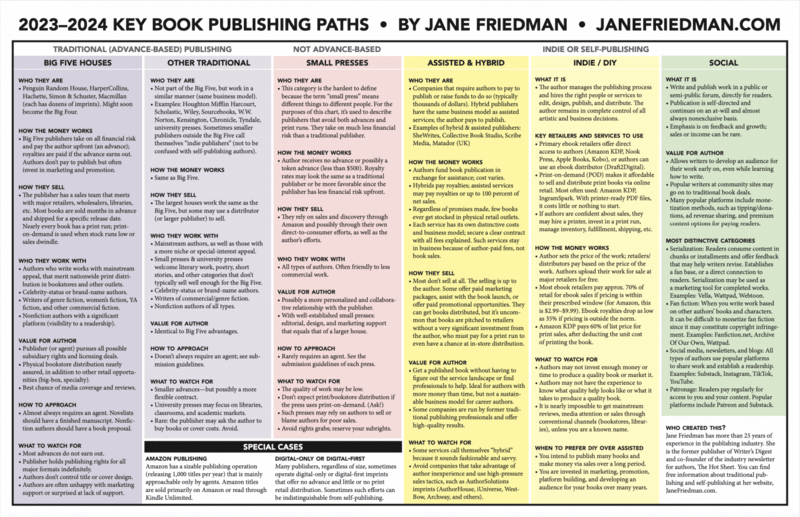- There are now many varieties of traditional publishing and self-publishing, with evolving models and diverse contracts.
- It’s not an either/or proposition; you can do both. Many successful authors, including myself, decide which path is best based on our goals and career level.
Getting your book published in 2023
This, via Warren Ellis, is a useful resource. I also like that its creator, Jane Friedman, has made it available to be downloaded, printed, and shared “no permission required” (although I wish she’d explicitly used a CC0 license)
When I shared this with a friend, they pointed out that it doesn’t include the ‘kickstarter’ kind of model. While Friedman points out that the chart is primarily for ‘trade press’ (i.e. books with a general audience) there’s a whole different type of approach, which I kind of pioneered a decade ago with OpenBeta and which is more easily achieved these days with platforms such as Leanpub.
(click on image to download PDF)
One of the biggest questions I hear from authors today: Should I traditionally publish or self-publish?Source: The Key Book Publishing Paths: 2023–2024This is an increasingly complicated question to answer because:
Thus, there is no one path or service that’s right for everyone all the time; you should take time to understand the landscape and make a decision based on long-term career goals, as well as the unique qualities of your work. Your choice should also be guided by your own personality (are you an entrepreneurial sort?) and experience as an author (do you have the slightest idea what you’re doing?).
Personal Publishing Principles
I really like the approach of coming up with your ‘personal publishing principles’ for your website, blog, and newsletter. This is CJ Chilvers' version, which I discovered via Rebecca Toh. Below are some of my favourites from CJ’s list.
This is the place to try out all the crazy ideas/projects/products I come up with. Only 1 in 100 of them will resonate, so I need a place that feels good to put up 99 failures — at least. You don’t need 100 products necessarily. But you probably need 100 landing pages.Source: Personal Publishing Principles | CJ Chilvers[…]
Fail in public. Try things. Don’t be boring. See what sticks.
[…]
Curation still matters because “it’s not the customer’s job to care.” To paraphrase Dave Pell, Seth Godin, and Hugh MacLeod: no one gives a shit about you or your projects. Bring them something really interesting from all corners of the web and they’ll read next week…maybe.
Image: Cris DiNoto
Subscriber count as power level against algorithmic demons
I’ve done a lot of writing for work this week and needed to hear some of the things in this post by Justin Murphy. Great stuff.
Mustering the discipline to write on a regular basis is a battle against yourself, against your own feeling that it doesn't matter.Source: Writing is a Single-Player Game | Other LifeFinding the will to click the publish button is a battle against yourself, against your own feeling that it’s not worth it.
You feel nervous about what your readers will think, but that makes no sense. They subscribed to you because they want to know what you think; you have zero reason to care what they think. If you really care what your readers think, then go subscribe to them. You are not subscribed to your readers because you do not care what they think. Now act like it.


